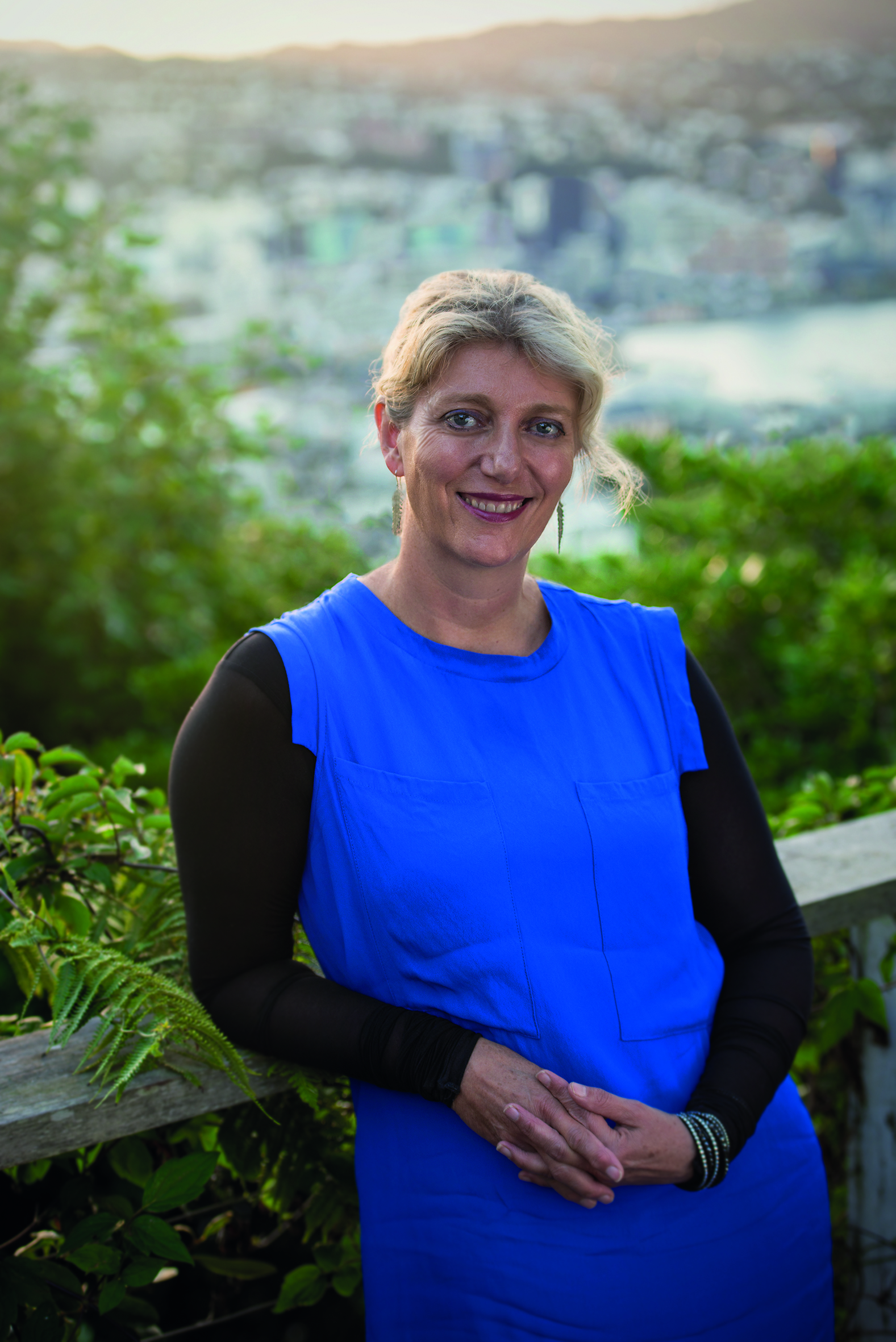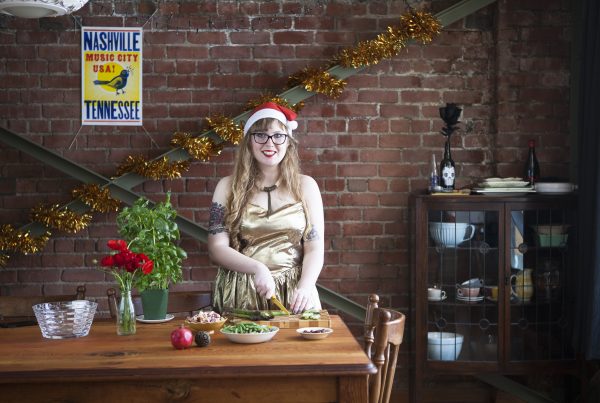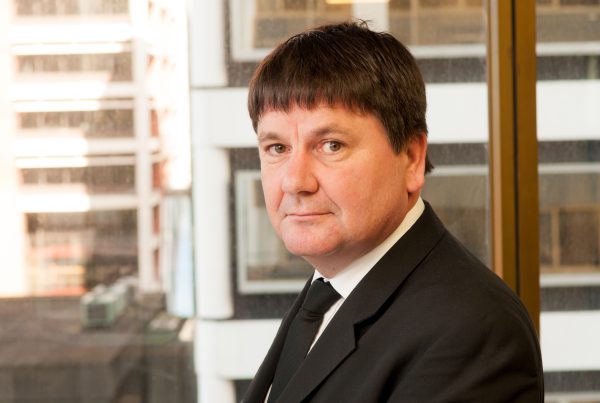Chickens.
It was the chickens that told me I’d got this one wrong.
When Dan the editor let me know that my next assignment would be an interview with Melissa Clark-Reynolds, I drew a blank. Dan, in his admirably concise way, said something like “successful businesswoman, really interesting, I think she’ll be great”.
And then, chickens.
There’s no getting away from the fact that Melissa Clark-Reynolds lives in one of plutiest streets in town. There’s a view across to Pencarrow to the right, and to the left, the city is laid out like a box of fairy lights waiting for a tree.
But Melissa’s gate is a modest thing, and once I get it open, there is no whitewashed Roseneath palace waiting behind it, just a pretty vertiginous set of steps leading down to a bog-standard and pleasantly dishevelled weatherboard house. And standing guard on the steps, spoiling for a feed or a fight, are a gang of decidedly good-looking chickens.
Now, I’m kept by chickens myself, and I appreciate a healthy gaggle when I see them. These are some fine-looking fowl, but surely they are a bit out of place here.
Back home in Paekakariki, the locals look at you with pity and suspicion if you confess to not having a few chooks around the house. But this is Roseneath, and though I might expect to see the toniest of organic, free-range and probably Montessori-educated egg-brand cartons in the recycling bins around here, I’m not actually expecting to meet any livestock.
So, I’m kind of wide-eyed and bemused as I get to the front door, which is instantly flung open by a perfectly excellent-looking woman of about my own age, who I recognise immediately as someone I’ve had a yarn with at a few parties.
Whose name, I remember, is Melissa.
Melissa Clark Reynolds whoops with laughter.
Hah! You didn’t know it was me did you!? Come in, we’re having some people over for a barbecue soon. You’ll stay, eh?
And all I can reply, as the scene sinks in, and my daft preconceptions crash down around me, is, “Chickens. You have chickens.”
Yeah. Come and meet them. I’ll show you around.
Melissa’s house is terrific, it really is. If you could see it, you would love it too. It’s an older place — 1930s or 1940s if I had to guess — on a scrubby and steep bit of land high above Oriental Bay, more than three-quarters of the way up Mt Victoria. It is a seriously lovely spot, and I like very much that the house that occupies it is modest, cosy and pretty much dwarfed by its own wooden decks.
When I bought the place, the deck wasn’t here. It was the first thing I did. Can you imagine? Someone lived here for years, and never wanted to sit outside and see all this on a summer’s evening.
So, that’s the setting. We chat for half an hour or so like old mates, and then, as I belatedly realise that the barbecue is getting busy, and Melissa has a dozen other things she needs to do, I actually ask a couple of questions, which inevitably lead to us heading off on another agreeable tangent.
I did an honours degree in anthropology at Victoria, and that was fantastic. I talk a lot now at high schools, and I often talk to groups — boys mainly — who want to be game designers, and I
Just imagine what our education system could be if we designed it again from the ground up…
This is a subject that is closer to my heart every day. And, looking back over this whole series of FishHead interviews, I can see it is becoming a recurring theme.
Maybe we should host a dinner party for Tilly Lloyd, Andrew Armitage, Nicola Gaston, John Edwards, Sima Urale, Peter Hambleton, Joy Cowley, Rodger Fox, Annette King, The Bresolin brothers, Russ Kalivati and all the others, and record the conversation. There must be a documentary in that, surely?
I was an unusual kid, I went to university at 15. And I know for a fact that I didn’t find a community of people who were into the same stuff — a group of people that I felt real common interest and common aims with — until I was at university.
So, I hear all these people today worrying that social media is in some way making kids more isolated — and I know that there is a point to what they are saying, it is true that there are kids sitting at home chatting on a media platform, when once they might have been having those same conversations on the bus or whatever — but we forget that there’s a whole other group of kids that social media enables in a way that nothing else did.
The kids who didn’t talk on the bus, or join the clubs at school, the ones who are a bit different and whose interests are a bit out of the usual New Zealand sphere; suddenly these kids have got the whole world to talk to.
The media — the old media — they are so wilfully misleading about that. All they are interested in is the so-called dangers of social media — the times it gets used for bad — but that is just absurd. For every ‘bad use’, there’s a million positive interactions between people around the world who might never otherwise have met, sharing discoveries, writing, music, art, science.
You might just as well try to demonise the telephone.
Melissa Clark-Reynolds is described by most websites she appears on as a ‘serial technology entrepreneur’. She was the youngest woman to attend university in New Zealand. When accident compansation insurance was opened up to competition in 1999, she transformed her health and safety consultancy into Fusion, New Zealand’s largest private accident compensation insurer (eventually selling to Southern Cross). She talks and mentors around the country on leadership and entrepreneurship. She sits on several boards, including Radio New Zealand, Attitude TV and the Ministry for Primary Industries Investment Advisory Panel, and she was a director of the New Zealand Centre for Gifted Education. Melissa is also a ferociously good dinner guest, and a complete hoot to talk to.
I’m looking at the TV services that are available now, and all they’re doing is trying to save their traditional model. Same with banks — their websites are just teller machines on your laptop. But it’s just so… dated, already.
And when the traditional models try digital, that’s all you get. But that’s not even scratching the service of what a digital world can deliver. The broadcasters and the banks and the newspapers, and all the other businesses who have tried to launch Internet products, they just don’t get it. Or they do get it, but they can’t see any way of making money out of it, so they’re running scared and trying any stopgap they can make.
But we already know what the future looks like. And, unfortunately, it’s the pirates who got there first. The future is people choosing exactly what they want to watch, or read, or do, from anywhere in the world, at any time they want to have it.
Now, there is no getting away from that, and anyone who tries to delay it happening is going to go under. But they are all forgetting that the good providers — the good writers, the great newspapers and programme-makers and filmmakers — will always find an audience.
And I honestly believe that people will still want to have books on their shelves, and magazines in their racks and a night at the movies, because there are very sound physiological and psychological reasons why those things still have real value to us.
I hate the pirates as well. Artists, musicians and creators have to be paid for their work. So that’s the challenge. And I really wonder whether it is the challenge that will start to usher in a whole new system of payment, a whole new way of commerce that is quite different from what we have now.
It is one of the things we find ourselves taking about a lot. Of making the new media pay, but keeping it within everyone’s reach. There is a greater need — and demand — today than ever before for stories, quality journalism, great narratives, but the business models that once supported the industry are effectively dead in the water. We are living through a revolution, which Melissa argues has not even really begun.
Ideas are easy — you and I could sit here and brainstorm for ten minutes and come up with a whole raft of ideas. But really, who gives a fuck? It’s the execution that matters, and that takes real thinking.
I hear about ‘innovation’ all the time, and it’s such a meaningless word. So what if something is new? That doesn’t of necessity make it better. Innovation isn’t the same thing as improvement. Anyone can come up with something ‘innovative’, but coming up with a genuinely good idea that makes people’s lives better? That takes thinkers, not these buzz-word spouters we seem to be employing.
At which point I’m nodding along in agreement with such vehemence I damn near put my neck out.
How do we identify problems worth solving, and then solve them? That’s what we should be asking.
Why aren’t we teaching philosophy in school? Anyone who knows what philosophy actually is, knows that this is a good idea. But the problem is the name. If we just called it ‘common sense and critical thinking’, then all these parents who don’t want their kids to be learning ‘namby-pamby’ philosophy would jump at it. It’s branding.
I think in your life, you might find yourself thinking about some really big problems. Not just our petty day-to-day stuff, but peace, prosperity, poverty… the big things, and I think that here, in the safe, warm, secure countries, we have a moral obligation to put resources — especially our intellectual resources — into solving these problems. There are solutions, though they might be economically unpalatable to some people at first, and we have to work out ways to implement them. I think we owe that to the world.
Something that matters so much to me is service — working in the service of other people. I’m in a position now where I can actually spend some time helping other people, and it’s fantastic, but everyone should know the value of that. Spending time sharing knowledge and ideas — that shouldn’t be a luxury. That should be something everyone has the chance to experience, but so many people don’t think they have the time, or worse, they don’t think they have anything to offer.
I ask Melissa what she would do if she could instantly change one thing in Wellington. Her answer is immediate and unequivocal.
Real high-speed Internet, free for everyone.
In New Zealand, we are a long way from our physical markets. There’s nothing we can do to shorten the distance, but we work hard and we spend money to at least make the transport as modern and cost-effective as it can be.
But our weightless exports — our digital providers, and in Wellington we have some absolutely world-beating companies — we are stuck with Internet that is years behind what Europe and Asia are using. People might snort about First World problems or whatever, but Internet connectivity is the equivalent of road and rail and ships for hundreds of New Zealand companies. And our infrastructure simply isn’t up to the standard of our competitors, and our markets.
That and, nationally, an education system that teaches thinking and curiousity, not just the retention of pre-existing knowledge.
Spoken like an inner-city chicken-owner I reckon. But, I am biased.
You know, I love New Zealand. I choose to live here, and I choose to live in Wellington. It’s a fantastic place. I love that I can be swimming at a clean beach in the middle of a city, and that I can catch a bus into town, or walk across the whole central city, and I don’t have to join a gym to get my exercise. But I am always going to be one of those people who revolts against ideas that aren’t working. I love this place, and this life, but things can be better, for everyone, and I reckon if we can make things better, then we have to commit to that.





